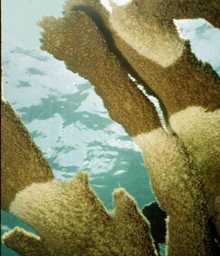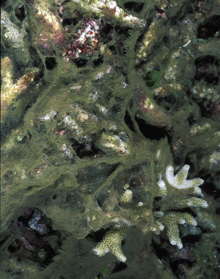About Coral Disease

This stand of threatened Acropora palmata, or Elkhorn coral, suffers from white band disease. Click image for larger view and image credit.
In recent decades, scientists have documented an explosion of apparently new and damaging coral diseases, potentially linked to increasing water temperatures and decreasing water quality. The Caribbean has been especially hard hit, where diseases and other threats have decimated formerly dominant, shallow-water populations of two coral species such that they were recently listed as "Threatened" under the federal Endangered Species Act.
Recent outbreaks of highly virulent diseases have been reported in deep-water reefs and more remote locations and are having disproportionate impacts on slow-growing, massive reef-building corals. Diseases now affect over two-thirds of Caribbean coral species and new disease outbreaks are being reported in the Pacific.
Diseased corals or other reef-dwelling organisms negatively affect reef health. In 1982-1983, an unknown waterborne pathogen spread throughout the Caribbean, causing mass mortality of the long-spined sea urchin, Diadema antillarum, which is considered a "keystone" herbivore. The disease caused the loss of up to 90-95 percent of the Diadema population. The urchin populations, now almost entirely gone, could no longer keep algae growth in check. The sharp rise in algae damaged many reefs, shifting them from coral reefs to algal reefs (habitats dominated by algae).

This dying coral colony has been overgrown by algae. Click image for larger view and image credit.
Left unchecked, coral diseases will continue to degrade reef ecosystems and the economies that depend upon them. Although the list of emerging diseases, their geographic range, and the number of affected species keeps growing, our understanding of these phenomena remains limited. Researchers have made progress in characterizing the ecology and causes of several common coral diseases, but most diseases are still poorly understood.
In the future, NOAA scientists would like to better understand what causes coral diseases, develop effective management approaches that address the stresses believed to cause disease outbreaks, and provide site-specific conservation approaches to reduce disease occurrence.
Related Web Sites
Coral Disease and Health Consortium
Elkhorn and Staghorn Corals Listed in Threatened Status (pdf)
